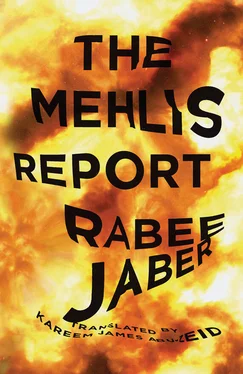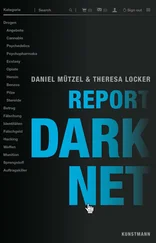Saman Yarid laughs, hoping to get Mary to change the subject. He laughs, saying America wouldn’t give him a visa. And even if they did give him one, he couldn’t leave because the Riyashis had beat him to it, and he was in charge of their garden now. And he says he’s lucky they didn’t leave their dog behind as well, and laughs some more.
Mary laughs too, but only for a moment. She goes back to saying things are different this time, they’re more dangerous than before. If they can kill the Prime Minister himself, what’s to stop them from destroying the whole city?
Saman Yarid reassures his sister. He says the news makes mountains out of molehills. You shouldn’t believe everything you hear on TV, he says, those are just exaggerations, and there’s an international commission investigating things right now — that German prosecutor Detlev Mehlis is no fool, and he’ll be presenting his report to the UN in just a few days. There’s a big difference between the local police and the Security Council.
Saman grows tired as he speaks. He wants to stop talking, but he’s afraid his sister will start up again. What if he just hung up? No, he can’t. He’ll just have to be patient.
He stops speaking and lets Mary start over, from the beginning. She says she’s seen the explosions on TV. She’s seen them all. And she reads the Lebanese papers on the Internet. She reads them everyday. Her children print the news from the computer. How can he say Beirut won’t be destroyed? Mother Mary save us all! O our Virgin Lady. Our Father who art in Heaven. Saman, how can you deny this? I saw Hariri on TV. I saw his hand. I saw the scorched cars and the collapsing hotel. No, Saman, my brother, no. You can’t stay in Achrafieh while all this is happening. They’re still planting bombs at night now. But what will you do if they start planting them during the day, in the markets and buses and shopping malls? What will you do? Saman, the light of my mother! Saman — the light of my life, and of your sister, Emily — don’t leave the house at night! Hana called you a few nights ago, but the phone just kept on ringing: no one picked up. Don’t leave the house at night, my brother. Why are you staying there? Why don’t you come to our place? Or go to Emily’s! Why are you staying in Beirut? What’s keeping you in your house? I saw the Geitawi explosion on TV. I recognized the buildings — my aunt’s house. All your cousins are here, in Detroit and in Canada. Why are you staying in Achrafieh? I saw the shattered windows. I saw the old people sitting on their chairs. And the wounded. And the burnt corpse they were carrying, and the ambulance stuck between the fire trucks. I saw it all on TV. And the whole time I was afraid I’d see you as well, Saman. You’re my life, Saman — don’t leave the house at night. I know you. I know you never stay home. I know you spend all your time walking through the streets. What’s keeping you in Achrafieh, my brother? Hear it from my own lips: Pack your things, lock up the house, and come to Baltimore. We’ll book your ticket from here. Don’t trouble yourself with anything, don’t call the embassy, don’t do anything at all. Just get yourself to the airport. For my sake, Saman. The children miss you.
His sister’s heated words don’t upset him. He knows she’ll calm down. She has to let it all out, all those words inside her, then she’ll calm down. All he can do is be patient. He lets her talk while the light pours through the thick colored glass of the high circular skylight. Where can you find a skylight like this in the houses they’re building in Beirut these days? Where? Nowhere: only in the old neighborhoods. And in some of the mansions in the Ramil district. And in the mansions they’ve so carefully restored in the Wadi Abu Jamil neighborhood. These high round skylights. This stately Venetian glass. Light pours through that precious window — blue triangles, green squares, yellow diamonds, bright circles. The light shines through the thick glass and enters the house, the glass slowly saturated. You can see the colors gradually intensifying, radiating. And then — at some moment or another — the light streaming out of the glass bounds back up and fills the ceiling with wondrous forms, pours even onto the ceiling, welling up from the heart of the antique window.
On the other end of the line, Mary’s fear has subsided. Saman can hear other voices now. That’s the voice of his brother-in-law Hana, who’s also his cousin. There’s a third voice too, but he can’t tell whose — the connection is no longer as clear as it was at the beginning of the call.
The sounds of the neighborhood come through the walls as well, even though Achrafieh is usually quiet. There’s never any noise here during the day. At night, if Monot is busy, it gets louder. During the day it’s generally quite calm. There isn’t much noise, and there aren’t many cars. He’s rarely here during the day. And when he does stay, he can hear the sparrows in the oak trees. But he can’t hear them now, the birds. This call has worn him out and made him irritable. They have an oak tree that’s eighty-five years old. His grandfather planted it with his own two hands. He planted it the same year he bought this land. They still have the deed to it. And the date in black ink at the bottom reads: 1920. His grandmother told him the area used to be filled with sycamores and cacti and briar back in the days when his grandfather planted that tree. The Jesuit priests had said an oak wouldn’t grow on the coast, that they can’t take the heat and the humidity, they like high climes and dry cold weather. Don’t cast your wheat on rocks and thorns, Ibn Yarid, they’d said. But his grandfather planted the oak anyway. He planted it here, and here it still lived. The passersby could see it from the street, behind the high walls surrounding the courtyard. And they could hear the birds chirping in the tree’s heart. It towered over the house, over that high pyramid of tiles, and covered one side in shade, sheltering the parlor windows and the dining room. Even in the intense heat at the height of summer, the parlor stayed cool because of that tree. During Camille Chamoun’s presidency in the 1950s, its roots broke through the tiled floor of the spare bedroom beside the dining room. They said the oak tree would crack the walls, and the house might collapse. They wanted to chop it down. But his grandfather refused. He dug a hole outside the house, cut off part of the tree’s roots, and then poured concrete into the hole. His grandmother told him his grandfather once had a dream in which the tree kept growing until its branches covered the whole Jesuit University. In the summertime, when they set the table outside in the lush shade and drank arrack and ate meze and grilled meat and vegetables, he used to tell his friends and relatives about that dream. And when his grandfather grew old, he would get up every morning and sit in the oak tree’s shade. Achrafieh was a desert of cacti and scattered sycamores when he built this house. There was hardly a single building here. Just the yellow stone structure of Saint Joseph’s College (the Jesuit University) out there among the sycamores. And some distance away from it, the Jesuits’ stables, and their monastery. They all knew your grandfather. And your grandfather knew them. There was a spring where the tailor’s shop is now. We used to call it a spring, but it wasn’t really a spring — it was a well. The priests made a pump for it, a copper one, and we used to fill our water jars over there. Then your grandfather laid copper snakes out to the municipality’s water project and we stopped getting our water from the “Jesuit Spring.” All of these houses and buildings that you see now used to be terraced fields of mulberries. And after your grandfather built his home, Ibn Bustrus built a house on the land beside the university. Then the houses began to multiply. Your grandfather also built the “Mexico Villa,” the big stone house past the police station — he’s the one who built that.
Читать дальше












